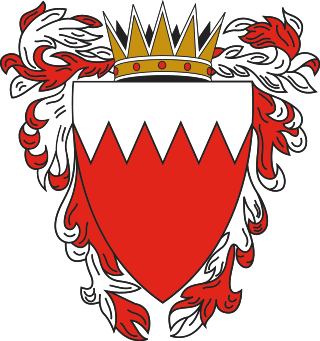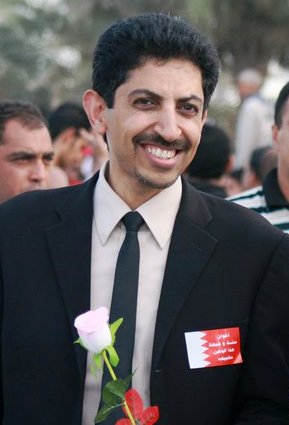Related Research Articles

Khalifa bin Salman Al Khalifa was a Bahraini royal and politician who served as the Prime Minister of Bahrain from 10 January 1970 until his death in 2020. He took office over a year before Bahrain's independence on 15 August 1971. He was the longest-serving prime minister in the world. Under the 2002 Constitution he lost some of his powers, with the King now having the authority to appoint and dismiss ministers.
Akhbar Al Khaleej is a Bahraini daily publication. It is the sister paper of the English-language daily, Gulf Daily News.

Bahrain's record on human rights has been described by Human Rights Watch as "dismal", and having "deteriorated sharply in the latter half of 2010". Their subsequent report in 2020 noted that the human rights situation in the country had not improved.

The cinema of Bahrain is small as its lacks support from the government and the private sector. There are many short films produced by individual filmmakers, and about five feature films in Bahrain's history.
Bahrain has been connected to the internet since 1995, and made it readily available to its citizens. The country's domain suffix is '.bh'. A 2004 study showed a liberal filtering system is used in Bahrain, one which can be easily bypassed, however more recent events have shown more sophisticated and pervasive filtering. In January 2009, Bahrain has started blocking a vastly increased number of sites through the Information Affairs Authority (IAA). The new filtering has had a noticeable impact in internet access speeds for all traffic.

Bahrain, officially the Kingdom of Bahrain, is an island country in West Asia. It is situated on the Persian Gulf, and comprises a small archipelago made up of 50 natural islands and an additional 33 artificial islands, centered on Bahrain Island which makes up around 83 per cent of the country's landmass. Bahrain is situated between Qatar and the northeastern coast of Saudi Arabia, to which it is connected by the King Fahd Causeway. The population of Bahrain is 1,501,635 as of May 14, 2023, based on elaborations of the United Nations data, of whom 712,362 are Bahraini nationals. Bahrain spans some 760 square kilometres (290 sq mi), and is the third-smallest nation in Asia after the Maldives and Singapore. The capital and largest city is Manama.

Ali Hassan Abdullah Abdulemam, widely known as Ali Abdulemam is a Bahraini liberal blogger and contributor to Global Voices. He is the founder of Bahrain Online, a popular online forum and pro-democracy news website, and a member of the research and advocacy group Bahrain Watch. Although he went into hiding in March 2011 to escape the Bahraini Government's crackdown on protesters, he was convicted in absentia for plotting to overthrow the Government, and sentenced to 15 years in prison. Global human rights organizations are unconvinced of Abdulemam's guilt and have voiced opposition to the persistent censorship and obstruction of journalists in the region. In 2013, Abdulemam escaped to the UK where he was swiftly granted political asylum.

The 2011Bahraini uprising was a series of anti-government protests in Bahrain led by the Shia-dominant and some Sunni minority Bahraini opposition from 2011 until 2014. The protests were inspired by the unrest of the 2011 Arab Spring and protests in Tunisia and Egypt and escalated to daily clashes after the Bahraini government repressed the revolt with the support of the Gulf Cooperation Council and Peninsula Shield Force. The Bahraini protests were a series of demonstrations, amounting to a sustained campaign of non-violent civil disobedience and some violent resistance in the Persian Gulf country of Bahrain. As part of the revolutionary wave of protests in the Middle East and North Africa following the self-immolation of Mohamed Bouazizi in Tunisia, the Bahraini protests were initially aimed at achieving greater political freedom and equality for the 70% Shia population.
Esra'a Al Shafei is a Bahraini civil rights activist, blogger, and the founder and executive director of Majal and its related projects, including CrowdVoice.org. Al Shafei is a senior TED Fellow, an Echoing Green fellow, and has been referred to by CNN reporter George Webster as "An outspoken defender of free speech". She has been featured in Fast Company magazine as one of the "100 Most Creative People in Business." In 2011, The Daily Beast listed Al Shafei as one of the 17 bravest bloggers worldwide. She is also a promoter of music as a means of social change, and founded Mideast Tunes, which is currently the largest platform for underground musicians in the Middle East and North Africa.

Nabeel Ahmed Abdulrasool Rajab is a Bahraini human rights activist and opposition leader. He is a member of the Advisory Committee of Human Rights Watch's Middle East Division, Deputy Secretary General for the International Federation for Human Rights (FIDH), former chairman of CARAM Asia, member of the Advisory Board of the Bahrain Rehabilitation and Anti-Violence Organization (BRAVO), and Founding Director of the Gulf Centre for Human Rights (GCHR).
Zakariya Rashid Hassan Al-Ashiri, also spelled Al Asheri and Aushayri,, was a forty-year-old Bahraini blogger and journalist, worked as an editor and writer for a local blog news website in Al Dair, Bahrain. He was killed on April 9, 2011, while in custody of the Bahraini Government. Al-Ashiri was the first journalist in Bahrain to die in direct relation to his work since The Committee to Protect Journalists started keeping records in 1992, and he was the first to die in the Bahraini uprising (2011–present).
Naji Ali Hassan Fateel is a Bahraini human rights activist and member of the Board of Directors of the Bahraini human rights NGO Bahrain Youth Society for Human Rights (BYSHR). Since 2007 he has been imprisoned, tortured and the target of death threats during the Bahraini uprising (2011–present). He has been the subject of urgent appeals by international human rights organisations and the United nations special Rapporteur on Human Rights Defenders.

Abduljalil Abdulla al-Singace is a Bahraini engineer, blogger, and human rights activist. He was arrested in 2009 and 2010 for his human rights activities and released later. In 2011, he was arrested, allegedly tortured and sexually abused, and sentenced to life imprisonment for pro-democracy activism during the Bahraini uprising.

The Day of Rage is the name given by protesters in Bahrain to 14 February 2011, the first day of the national uprising as part of the Arab Spring. Inspired by successful uprisings in Egypt and in Tunisia, Bahraini youth organised protests using social-media websites. They appealed to the Bahraini people "to take to the streets on Monday 14 February in a peaceful and orderly manner". The day had a symbolic value, being the ninth and tenth anniversaries of the country's 2002 constitution and the National Action Charter respectively.

The March of loyalty to martyrs was a protest on 22 February 2011 in Manama, Bahrain. Tens of thousands participated in the protest, one of the largest in the Bahraini uprising. Named after the seven victims killed by police and army forces during previous protests, the march filled the space between Bahrain mall and Pearl Roundabout. Protesters carried Bahrain's flag and demanded the fall of the government, implementation of a constitutional monarchy and other reforms, with some of them also demanding the end of the regime.

The Bahrain Thirteen are thirteen Bahraini opposition leaders, rights activists, bloggers and Shia clerics arrested between 17 March and 9 April 2011 in connection with their role in the national uprising. In June 2011, they were tried by a special military court, the National Safety Court, and convicted of "setting up terror groups to topple the royal regime and change the constitution"; they received sentences ranging from two years to life in prison. A military appeal court upheld the sentences in September. The trial was "one of the most prominent" before the National Safety Court. A retrial in a civilian court was held in April 2012 but the accused were not released from prison. The sentences were upheld again on 4 September 2012. On 7 January 2013, the defendants lost their last chance of appeal when the Court of Cassation, Bahrain's top court upheld the sentences.
The following is an incomplete timeline of events that followed the Bahraini uprising of 2011 from September 2012 onward.
Bahrain Tamarod, also known as August 14 Rebellion, was a three-day protest campaign in Bahrain that began on 14 August 2013, the forty-second anniversary of Bahrain Independence Day and the two-and-a-half-year anniversary of the Bahraini uprising. The call for protests had started in early July following and inspired by the Egyptian Tamarod Movement that led to the removal of President Mohamed Morsi. Calling for a "free and democratic Bahrain", Tamarod activists, who mobilized social networking websites, said their movement was peaceful, national and non-sectarian. They called for gradual peaceful civil disobedience starting from 14 August. The movement gained the support of opposition societies and human rights activists, including those languishing in prison. The government however, repeatedly warned against the protests, promising those who participate with legal action and forceful confrontation. Rights activists and media reported that authorities had stepped up their crackdown campaigns in the weeks leading to the protests.
Bahrain Watch is a "research and advocacy organisation" devoted to issues related to Bahrain. The group was founded in 2011 by several people, including journalist Ala'a Shehabi.
References
- ↑ Voicing Support for Arrested Bahraini Blogger Ali Abdulemam Global Voices. 7 September 2010. Retrieved 9 December 2013.
- ↑ Bahrain continues crackdown on Shi’ite opposition The Washington Post. 14 September 2010. Retrieved 9 December 2013.